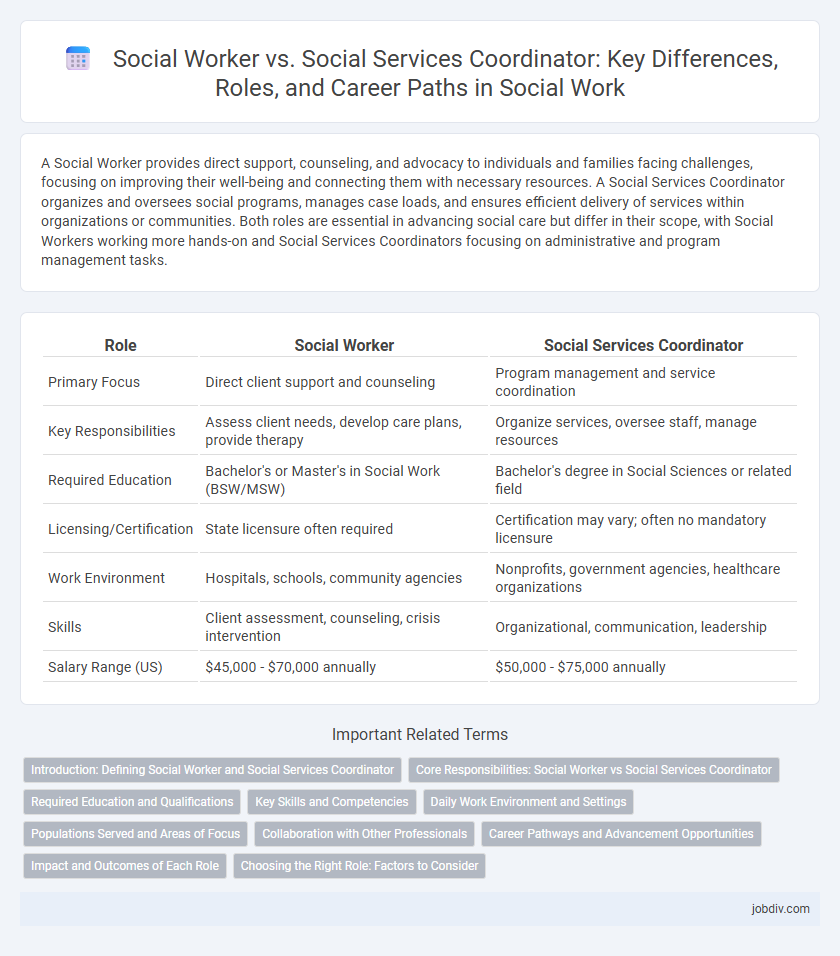A Social Worker provides direct support, counseling, and advocacy to individuals and families facing challenges, focusing on improving their well-being and connecting them with necessary resources. A Social Services Coordinator organizes and oversees social programs, manages case loads, and ensures efficient delivery of services within organizations or communities. Both roles are essential in advancing social care but differ in their scope, with Social Workers working more hands-on and Social Services Coordinators focusing on administrative and program management tasks.
Table of Comparison
| Role | Social Worker | Social Services Coordinator |
|---|---|---|
| Primary Focus | Direct client support and counseling | Program management and service coordination |
| Key Responsibilities | Assess client needs, develop care plans, provide therapy | Organize services, oversee staff, manage resources |
| Required Education | Bachelor's or Master's in Social Work (BSW/MSW) | Bachelor's degree in Social Sciences or related field |
| Licensing/Certification | State licensure often required | Certification may vary; often no mandatory licensure |
| Work Environment | Hospitals, schools, community agencies | Nonprofits, government agencies, healthcare organizations |
| Skills | Client assessment, counseling, crisis intervention | Organizational, communication, leadership |
| Salary Range (US) | $45,000 - $70,000 annually | $50,000 - $75,000 annually |
Introduction: Defining Social Worker and Social Services Coordinator
A Social Worker is a licensed professional specializing in providing direct support, counseling, and resources to individuals and communities facing social challenges. In contrast, a Social Services Coordinator manages programs and resources, ensuring efficient delivery of social services and collaborating with agencies to meet client needs. Both roles aim to improve well-being but differ in scope, with Social Workers focusing on hands-on care and Social Services Coordinators emphasizing administrative oversight.
Core Responsibilities: Social Worker vs Social Services Coordinator
Social Workers provide direct support and counseling to individuals and families, addressing mental health, crisis intervention, and resource referrals to promote well-being. Social Services Coordinators oversee program development, coordinate community resources, manage case documentation, and ensure compliance with agency policies to streamline service delivery. Emphasizing client advocacy, Social Workers focus on personalized care plans, while Social Services Coordinators optimize operational efficiency within social service agencies.
Required Education and Qualifications
Social Workers typically require a bachelor's degree in social work (BSW) or a related field, with many roles demanding a master's degree in social work (MSW) and state licensure for clinical practice. Social Services Coordinators often hold a bachelor's degree in social sciences, psychology, or public administration, emphasizing organizational and case management skills rather than clinical credentials. Both positions value coursework in human behavior, social welfare policies, and ethics, but Social Workers are more likely to need supervised field experience and ongoing professional development for licensure maintenance.
Key Skills and Competencies
Social Workers excel in empathy, crisis intervention, and case management, enabling them to provide direct support and counseling to clients facing personal challenges. Social Services Coordinators demonstrate strong organizational skills, program development expertise, and leadership abilities to manage social service programs and ensure efficient delivery of community resources. Both roles require excellent communication, problem-solving, and knowledge of social policies to effectively advocate for vulnerable populations.
Daily Work Environment and Settings
Social Workers primarily operate in clinical, community, and institutional settings such as hospitals, schools, and government agencies, engaging directly with clients to assess needs and provide counseling or crisis intervention. Social Services Coordinators typically function within organizational or administrative environments like non-profits or social service departments, managing program logistics, coordinating resources, and supervising staff to ensure effective service delivery. Both roles demand collaboration with diverse professionals, but Social Workers emphasize client interaction while Coordinators focus on operational management.
Populations Served and Areas of Focus
Social workers engage directly with diverse populations including children, elderly, and marginalized groups, addressing mental health, crisis intervention, and personal empowerment. Social services coordinators manage service delivery for broader community programs, coordinating resources focused on housing, employment, and healthcare access. Both roles prioritize improving quality of life, but social workers emphasize individualized support while coordinators oversee systemic service implementation.
Collaboration with Other Professionals
Social Workers collaborate closely with healthcare providers, educators, and legal professionals to develop comprehensive care plans tailored to individual clients' needs. Social Services Coordinators facilitate interdepartmental communication by organizing multi-agency meetings and ensuring resource alignment to support community programs effectively. Both roles rely on coordinated teamwork to address complex social issues and improve client outcomes.
Career Pathways and Advancement Opportunities
Social Workers typically pursue clinical licensure, enabling direct client intervention and specialization in areas like mental health or child welfare, which facilitates advancement into supervisory or clinical director roles. Social Services Coordinators focus on program management, client intake, and inter-agency collaboration, often progressing into administrative leadership or policy development positions within nonprofit or governmental organizations. Both career paths offer diverse opportunities for professional growth, with Social Workers emphasizing therapeutic expertise and Social Services Coordinators excelling in organizational and operational leadership.
Impact and Outcomes of Each Role
Social workers provide direct client support, address mental health issues, and advocate for individual well-being, resulting in improved personal outcomes and community integration. Social services coordinators manage programs, coordinate resources, and ensure service delivery efficiency, driving systemic improvements and enhanced organizational impact. Together, both roles contribute to holistic social care by balancing direct intervention with effective administration.
Choosing the Right Role: Factors to Consider
Choosing between a Social Worker and a Social Services Coordinator involves evaluating factors such as education requirements, job responsibilities, and career goals. Social Workers typically require a degree in social work and provide direct client support, while Social Services Coordinators manage programs and coordinate resources to enhance service delivery. Understanding personal strengths, desired interaction level with clients, and organizational preferences helps in selecting the most suitable role.
Social Worker vs Social Services Coordinator Infographic

 jobdiv.com
jobdiv.com